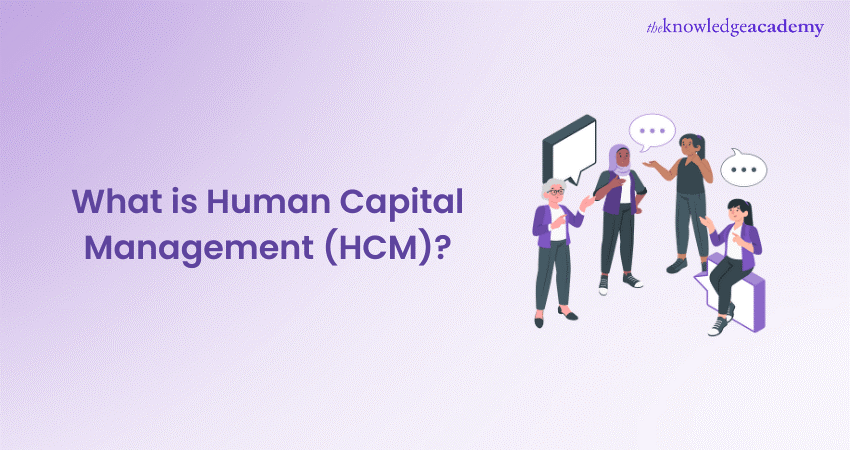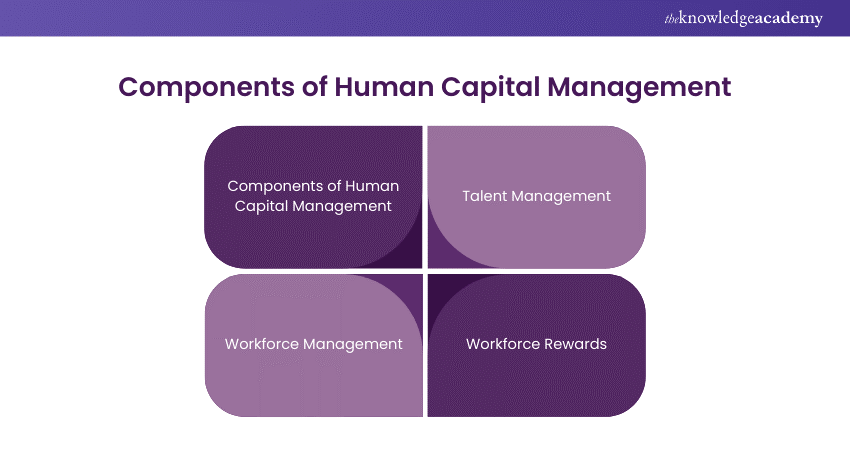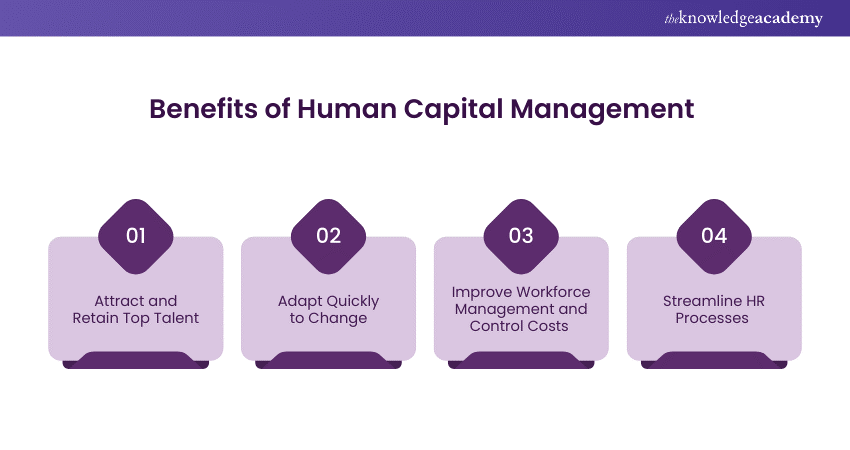We may not have the course you’re looking for. If you enquire or give us a call on +44 1344 203 999 and speak to our training experts, we may still be able to help with your training requirements.
Training Outcomes Within Your Budget!
We ensure quality, budget-alignment, and timely delivery by our expert instructors.

Curious about the secret to a thriving business? It all comes down to how they manage their people. Human Capital Management (HCM) is a powerful strategy that maximises workforce potential through enhanced hiring, training, and employee engagement. By valuing employees as key assets, HCM boosts performance and ensures long-term success.
In this blog, we’ll explore what Human Capital Management is, why it’s crucial, and how it can revolutionise your business. Ready to dive in? Let’s get started!
Table of Contents
1) What is Human Capital Management (HCM)?
2) Why is Human Capital Management Important?
3) Key Components of Human Capital Management
4) How to Select a Human Capital Management System?
5) Benefits of Human Capital Management
6) Challenges of Human Capital Management
7) Future of HCM
8) Conclusion
What is Human Capital Management (HCM)?
Human Capital Management (HCM) is a strategic approach to managing an organisation’s workforce, treating employees as valuable assets. It includes functions like recruiting, onboarding, training, Performance Management, payroll, and benefits administration. By optimising these areas, HCM enhances Employee Engagement, productivity, and overall business performance.
Key points:
a) Recruiting and Onboarding
b) Training and Development
c) Performance Management
d) Payroll and Benefits
e) Employee Engagement
Why is Human Capital Management Important?
Human Capital Management is crucial because it directly affects how productive and satisfied employees are, which in turn influences the overall success of the business. A good HCM strategy helps companies attract and keep top talent, ensure employees are well-trained and ready for their roles, create a positive work environment and adapt to changes in the market. It also reduces costs through efficient management.
Key Components of Human Capital Management
Here are the several essential elements that work together to boost workforce efficiency:

Human Resources (HR)
HR is the core of HCM because it deals with the Recruitment Process, administration of new employees, internal communication and managing employees’ compliance with the law. It is because the HR departments ensure that those working for an organisation are treated right, and they get what they deserve in order to help the organisation maintain productivity.
Talent Management
This focuses on attracting, developing, and retaining skilled employees. It involves strategies like recruitment, training programs, and career development opportunities to keep employees engaged.
Workforce Management
This involves optimising employee schedules, attendance, and overall productivity. It ensures that the right number of employees are available to meet the business’s needs, improving efficiency without overworking staff.
Workforce Rewards
This refers to the remuneration offered to every employee in an organisation in form of wages, incentives, medical cover, and pension among others. Providing competitive rewards assist a business in the recruitment and maintenance of the most skilled employees.
How to Select a Human Capital Management System?
Here are the ways to choose Management system for your organisation:
1) Identify Business Needs
Determine what your business specifically requires. Do you need support with recruitment, performance management, or payroll? Clearly define these areas and look for systems that specialise in them.
2) Assess Integration Capabilities
Make sure that the HCM system can fit naturally into your current technology platforms such as payroll or financial. This assists in preventing the development of data silos and improving data exchange.
3) Prioritise User Experience
The system should be user-friendly for both HR professionals and Employees. Complex systems can lead to low adoption rates, so test the user interface to ensure it offers a smooth experience for all users.
4) Evaluate Data Management and Reporting
Robust Data Management and reporting features are crucial for making informed decisions. Ensure the system can track key metrics like employee performance, turnover rates, and payroll costs.
5) Check Vendor Reputation and Support
Research the vendor’s reputation by looking at customer reviews, support services, and case studies. This helps you understand how well the vendor supports its product and customers.
6) Consider Total Cost of Ownership
Look beyond the initial purchase price. Consider ongoing costs such as software updates, maintenance, and customer support. This helps to understand the total cost of ownership.
7) Perform a Pilot Test
Conduct a pilot test with a small group of users before full implementation. This helps find any issues and ensures the system meets your needs before rolling it out company-wide.
Learn about workforce planning tools with our Workforce Resource Planning Training – Join today!
Benefits of Human Capital Management
Here are the advantages of it:

Attract and Retain Top Talent
HCM helps companies attract and keep the best employees by offering competitive benefits and growth opportunities. When employees feel valued and supported, they are likely to stay with the company for a long time.
Adapt Quickly to Change
HCM allows businesses to quickly adjust to changes in the market. Whether it’s increasing or decreasing the workforce, starting new training programs, or changing compensation strategies, HCM provides the flexibility needed.
Improve Workforce Management and Control Costs
Effective workforce management ensures employees are scheduled efficiently, reducing overtime costs and preventing burnout. It also helps control labour costs by identifying areas where resources are not being used effectively.
Streamline HR Processes
Automating HR tasks like payroll, benefits management, and Performance Reviews reduces administrative work and ensures these important tasks are done accurately and on time. This allows HR professionals to focus on other activities.
Challenges of Human Capital Management
Implementing HCM can be challenging due to the following:
a) Change Management: Shifting to a new HCM system or strategy may require cultural and process changes.
b) Data Privacy Concerns: Ensuring data security and compliance with privacy regulations is crucial.
c) Keeping Up with Technology: Staying updated on the latest HCM tools and trends is necessary for effectiveness.
Learn to streamline hiring processes with our Talent Acquisition Training – Join today!
Future of HCM
HCM in the future is expected to be shaped by emerging technologies that include; Artificial Intelligence and Machine Learning. This assists in automating operations within the HR department as well as offers more information on the performance of the employees. Additionally, remote work and global talent pools are expected to continue growing, prompting businesses to adopt flexible HCM techniques.
Conclusion
We hope you have understood the importance of Human Capital Management (HCM). It’s a crucial part of any successful business. By effectively managing your workforce, you can boost productivity, cut costs, and stay competitive. With the right approach, HCM can revolutionise how you manage your employees, leading to long-term success.
Learn the techniques for improving organisational performance with our Talent Management Training – Join today!
Frequently Asked Questions

Human Resource Management (HRM) focuses on the day-to-day management of employees, while Human Capital Management (HCM) takes a broader view, including strategic planning and development.

The four stages of HCM are recruitment, development, management, and optimisation. These stages help in attracting, training, managing, and maximising the potential of employees.

The Knowledge Academy takes global learning to new heights, offering over 30,000 online courses across 490+ locations in 220 countries. This expansive reach ensures accessibility and convenience for learners worldwide.
Alongside our diverse Online Course Catalogue, encompassing 19 major categories, we go the extra mile by providing a plethora of free educational Online Resources like News updates, Blogs, videos, webinars, and interview questions. Tailoring learning experiences further, professionals can maximise value with customisable Course Bundles of TKA.

The Knowledge Academy’s Knowledge Pass, a prepaid voucher, adds another layer of flexibility, allowing course bookings over a 12-month period. Join us on a journey where education knows no bounds.

The Knowledge Academy offers various People Management Courses, including the Workforce Resource Planning Training, Talent Acquisition Training, and Talent Management Training. These courses cater to different skill levels, providing comprehensive insights into Information Security Risk Management.
Our Human Resources (HR) Blogs cover a range of topics related to Talent Management, offering valuable resources, best practices, and industry insights. Whether you are a beginner or looking to advance your Talent Management skills, The Knowledge Academy's diverse courses and informative blogs have got you covered.
Upcoming HR Resources – Learn about Human Resources Batches & Dates
Date
 Talent Management Training
Talent Management Training
Fri 21st Feb 2025
Fri 25th Apr 2025
Fri 20th Jun 2025
Fri 22nd Aug 2025
Fri 17th Oct 2025
Fri 19th Dec 2025







 Top Rated Course
Top Rated Course



 If you wish to make any changes to your course, please
If you wish to make any changes to your course, please


